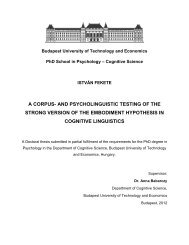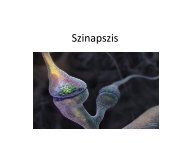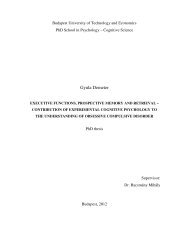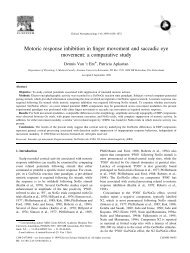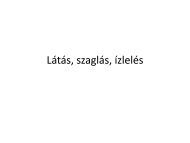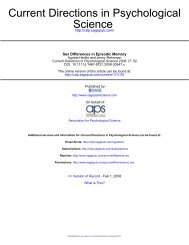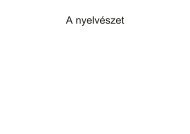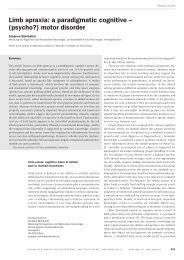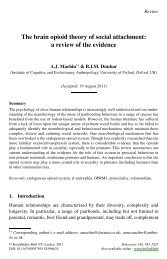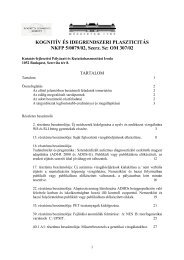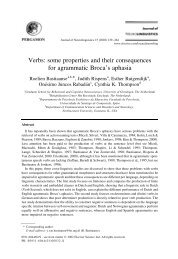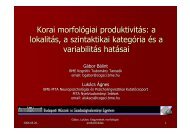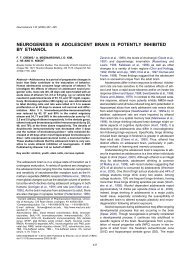Gyula Demeter PhD thesis booklet 1
Gyula Demeter PhD thesis booklet 1
Gyula Demeter PhD thesis booklet 1
Create successful ePaper yourself
Turn your PDF publications into a flip-book with our unique Google optimized e-Paper software.
mechanisms. We argue that set-shifting also requires the ability to<br />
inhibit previously acquired rules, a process mediated by the<br />
orbitofrontal cortex (Chamberlein et al., 2005). There is also a<br />
relation between symptom severity and performance scores, patients<br />
with more severe symptoms committed more perseverative errors on<br />
the WCST. Our findings support the view that the updating<br />
component of the executive system seems to be intact in OCD while<br />
the inhibition and shifting components are altered.<br />
Thesis II: Impaired PM functions in OCD<br />
OCD patients PM function is impaired compared to healthy subjects.<br />
PM instruction produced a significantly cost effect in OCD patients<br />
during the ongoing task due probably to an extra over-monitoring<br />
activity for PM cues.<br />
OCD patients commit significantly more false alarm type errors in a<br />
modified event-based PM task compared to healthy controls<br />
probably due to an overactivity of the PM system and the<br />
desinhibition of the activated inadequate responses. The patients who<br />
consider their PM performance poorer commit significantly more<br />
false alarm type errors.<br />
There are just a few studies with OCD patients or with<br />
subclinical groups characterized by dominant checking symptoms or<br />
obsessive tendencies in the domain of PM research (see e.g., Cuttler<br />
& Graff, 2009; Harris, Vaccaro, Jones, & Boots, 2010; Jelinek,<br />
Moritz, Heeren, & Naber, 2006; Marsh, Jameson, Cook, Amir, &<br />
6<br />
Hicks, 2009). In two consecutive experiments (Study 2 and Study 3)<br />
we have demonstrated the impairment of PM functions in event-<br />
based task in OCD, and contrary to previous interpretations we argue<br />
by an overactivity of the PM system.<br />
In our first experiment (Study 2) we found that OCD patients<br />
slowed down on the ongoing task in both the expectation condition<br />
(in which participants were told that PM stimuli might occur but<br />
none actually did) and execution condition (in which participants<br />
were told that PM stimuli might occur and they did) compared to<br />
baseline. We propose the occurrence of extra monitoring activity as<br />
probable cause for this finding. The PM instruction produced an extra<br />
monitoring activity for OCD patients that resulted in a more active<br />
search for PM cues. The higher latency and lower accuracy scores in<br />
the experimental trials compared to the control trials are evidence of<br />
monitoring activity (see Guynn, 2003; Kliegel, Martin, McDaniel, &<br />
Einstein, 2004).<br />
In our second experiment (Study 3) a modified PM task was<br />
used with minimal memory load suitable for patients under<br />
medication and with the goal of simulating a real life situation, where<br />
following a successful response to a relevant target, the response<br />
must be inhibited for the same target on the next encounter with it.<br />
This task compared to our previous experiment required a more<br />
intense monitoring activity from subjects concerning their own<br />
actions, making it appropriate for analyzing the monitoring activity<br />
through reaction times and errors made. We have found not just<br />
similar data regarding reaction times with our previous experiment,<br />
7



